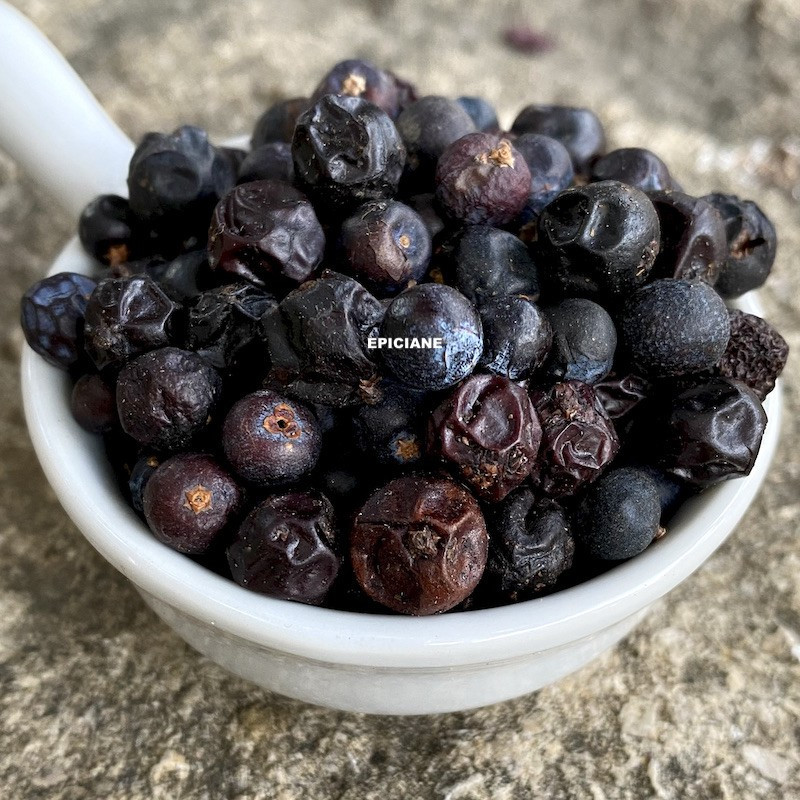
Reference: hypocras


Juniper berries have a very distinct, woody, and resinous flavor.
They are essential in sauerkraut, as well as in marinades, meat pâtés, and certain spirits.
 Delivery
Delivery
Mondial Relay
 Returns
Returns
See conditions
 Payments
Payments
100% secure
- Livré en sachet refermable -
Uses in Cooking and Beyond:
Juniper berries, which vary in color from dark brown to deep blue/purple and range in size from 5 to 9 mm in diameter, add a unique flavor to sauerkraut, meat pâtés, and game marinades. They pair wonderfully with these dishes, also making them easier to digest. Juniper berries can be added whole or slightly crushed (using a rolling pin, for example) at the beginning of cooking.
In northern France and Belgium, juniper berries are used to make gin. This spirit begins as a malt wine made from germinated barley and rye. The berries are added before the final distillation, and the gin is then aged in oak barrels to enhance its aromas. It is similar to British gin, Scandinavian sahti, and aquavit, all flavored with juniper berries.
Who am I?
Origin: Albania
Scientific name: Juniperus communis Linnaeus
Common name: Common Juniper
These spherical seeds have a diameter of 5 to 9 mm. The tannins in juniper berries have many properties, and the berries can be prepared in infusions, as can the young shoots of the shrub. However, juniper should not be consumed in excess, as it can become toxic, particularly for individuals with kidney conditions.
The wood of the juniper shrub is traditionally used in Scotland for smoking fish, such as salmon.
Common juniper is a shrub in the Cupressaceae family. Its berries are green when young, maturing to blue-violet. Its small, very spiny, gray-green leaves are evergreen, with a wide white band on the upper surface. The shrub grows to a height of 4 to 10 meters. The berries take two years to mature, so both green and ripe berries are found on the shrub, which are harvested from September to November.
Common juniper should not be confused with "cade" juniper, whose berries are not edible. Cade juniper has two narrow parallel bands on the upper side of its leaves, while common juniper has one wider band. Cade juniper berries are also much larger. Foraging juniper berries in the wild should be left to those who can distinguish between the two!
Common juniper grows widely in France and Europe, favoring moorlands and woodlands with calcareous soils. It thrives in dry, rocky areas.
A Little History:
Juniper berries were highly valued by the Greeks and Romans.
Juniper gin appeared in the 15th century in the Netherlands and has been made and consumed for centuries in northern France, where berries were harvested on calcareous hillsides. The first distilleries in northern France emerged after the Revolution and the First Empire, around 1810. In 2005, there were still 39 gin distilleries: 2 in France and the rest in Belgium and the Netherlands.
Data sheet
 Anne Marie P.
Anne Marie P.
Base des plats marinés
 Jean-Philippe L.
Jean-Philippe L.
bien

 Anne Marie P.
Anne Marie P.
Base des plats marinés
 Jean-Philippe L.
Jean-Philippe L.
bien

Reference: hypocras
Reference: EPI2301010
Reference: 9N7669901
Reference: 6N7456401
Reference: gentiane
Reference: aubepinefl
Reference: angelique
Reference: 112930001
Reference: 408164502
Reference: 11N7866301
Reference: 6L5609803
Reference: 7K4954201
Reference: 121320001
Reference: 6K4878201
Reference: 9K5061101
Reference: laurierE
Reference: PL-EK0-07
Reference: 3N7201902

Juniper berries have a very distinct, woody, and resinous flavor.
They are essential in sauerkraut, as well as in marinades, meat pâtés, and certain spirits.